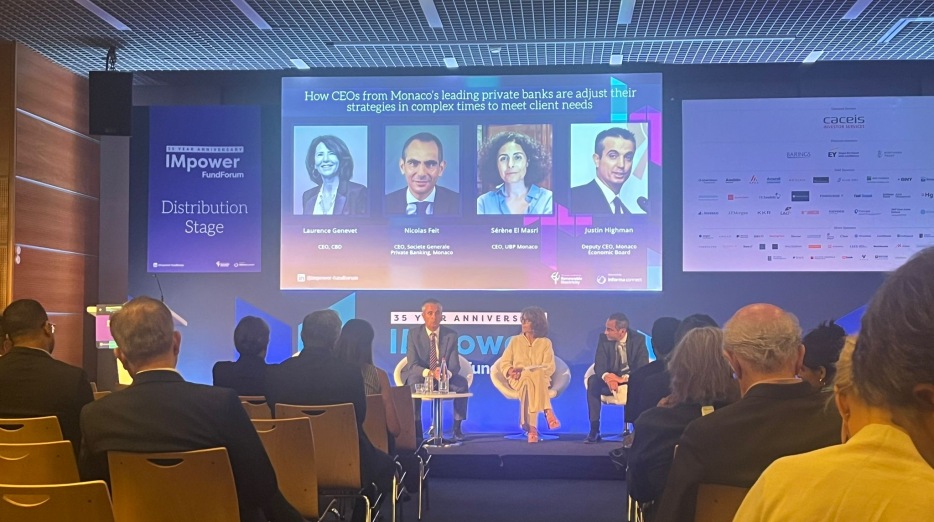
During the second round table organised by AMAF at the IMpower Fund Forum, three experts – Sérène El Masri (CEO of UBP), Nicolas Feit (CEO of Société Générale Private Banking) and Justin Highman (Deputy CEO of the Monaco Economic Board) – shared their views on the specific characteristics of Monegasque clients, investment trends, growing regulatory pressure and strategies to enhance attractiveness. A discussion with multiple voices.
Right from the outset, Sérène El Masri, CEO of UBP Monaco, set the scene: in Monaco, it is impossible to define a single investor profile. ‘The Principality attracts clients from all over the world: British, Italian, Swiss, Eastern Europeans, Middle Easterners… Their financial behaviour often reflects that of their country of origin, with one common denominator: a net worth above the average of other financial centres.’
Nicolas Feit adds: ‘Ten per cent of clients account for around 70% of assets under management in Monaco, out of a total of €170 billion.’ These ultra-high net worth individuals have broad access to financial solutions, with a growing appetite for diversification and alternative investments, particularly private equity.
When asked about the impact of sustainability, Nicolas Feit distinguishes between two groups: “Some clients are not interested in it at all, while others attach great importance to it, especially in the context of their foundations or philanthropic commitments. They demand total transparency on investments. “
He also highlights the importance of the Blue Economy Finance Forum held recently in Monaco, in line with the maritime DNA promoted by the Sovereign Prince. Blue finance is thus identified as a strategic differentiator.
Against a backdrop of geopolitical uncertainty, market volatility and interest rate normalisation, client behaviour is changing. Sérène El Masri notes: ‘For the first time, we are seeing clients focus heavily on currency risk.’ The majority remain cautious. “On the other hand, their younger children are more interested in the equity markets.
Uncorrelated assets such as hedge funds, semi-liquid private debt and real estate are also attracting a lot of interest. The return to a low interest rate environment, as in Switzerland where rates are at zero, is also encouraging clients to take more risks in order to achieve better returns, whether on their portfolios or their real estate.
Sérène El Masri details the scale of the regulatory challenge facing institutions in Monaco. “We are regulated by at least seven authorities: Monegasque, French – which issue our banking licences – and those of our institutions’ home countries. This means that we must comply at all times with the regulations adopted by all of these jurisdictions. ‘
She also clarifies the current situation: ’Monaco has been on the FATF grey list since June 2024 due to identified deficiencies in its anti-money laundering regime. This listing has automatically resulted in its addition to the European Union (EU) grey list. However, contrary to certain erroneous reports, the Principality is not on the EU blacklist. As a reminder, this list consists of OECD member countries with tax compliance deficiencies. However, the Principality’s NCD/CRS system, which is also regularly audited, has not been identified as deficient. “
The addition of Monaco to the EU’s grey list has not been without consequences for local banks. In particular, it has led to a drastic tightening of controls and requirements for customers, causing confusion and irritation among many of them. ‘In general, Monegasque banks were already ahead of many other financial centres in the fight against money laundering, as they apply European and British standards. Now we are required to go even further.’
Other regulatory requirements mentioned include local GDPR regulations, regulations following the collapse of Credit Suisse relating to prudential and environmental risks, international sanctions (Russia, Belarus, etc.), and the European DORA regulation on digital operational resilience.
Sérène El Masri adds: ‘That said, the adoption of these new regulatory requirements also demonstrates the strong resilience of the Monegasque financial centre. In 2024, it once again posted excellent results, supported by the solid ability of local banks to attract new clients.’
Justin Highman explains the role of his organisation: ‘The MEB is a hybrid structure, both a chamber of commerce and an economic promotion agency. We help entrepreneurs and investors to consider Monaco as a business destination.’
Several formats are used to promote the Principality: local conferences with renowned speakers, hosting foreign delegations, and international economic missions.
‘In Abu Dhabi, for example, five banks joined us to meet with family offices and financial centres.’ Tailor-made events are also organised at Monaco’s embassies abroad, with two components: one for advisors (lawyers, bankers, family officers) and another for entrepreneurs. ‘The aim is to plant a seed, not to sell at any cost.’
‘
On the innovation front, Nicolas Feit notes a definite interest among clients in assets such as stablecoins. ’We received numerous requests for information when they were launched.” But he also emphasises the challenges of cybersecurity, particularly for a place as exposed as Monaco. Artificial intelligence is seen as a lever for efficiency, but its use will have to be strictly regulated.
On this point, the creation of a sovereign Monegasque cloud is being discussed as a response to the protection of sensitive data.
Monaco remains very attractive to non-resident clients: ‘40% of assets under management belong to clients living outside Monaco,’ Nicolas Feit points out. Some wish to diversify by opening accounts in Zurich, London or Luxembourg. Others prefer to centralise everything in the Principality in order to benefit from cutting-edge expertise and a more flexible framework. This is particularly true given that the regulatory framework sometimes differs, with MiFID in Europe and LSFin in Switzerland, for example.
Monaco remains a unique location, both concentrated and open, traditional and innovation-oriented, subject to constraints but rich in opportunities. In this uncertain world, clients and banks alike are looking for clarity, advice and stability. This is a role that the Principality seems determined to play.